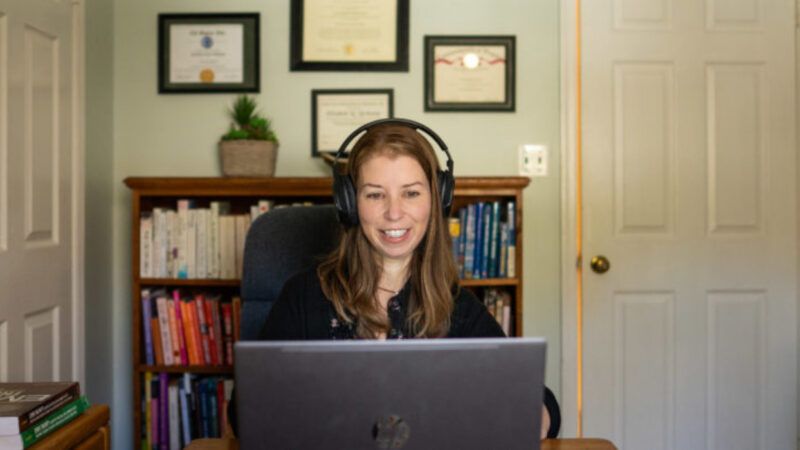Therapist Elizabeth Brokamp Fights for the Right To See Patients Virtually
"I hope my case can start removing senseless boundaries to teletherapy," said Brokamp, who is suing in federal court on First Amendment grounds.

Is Zoom therapy a First Amendment issue? Yes, according to a new Institute for Justice (I.J.) lawsuit, which argues that rules banning cross-border video counseling are violations of free speech.
I.J. is representing Elizabeth Brokamp, a therapist who saw patients from her Northern Virginia office before the pandemic hit. These days, Brokamp—who holds a master's degree in Counseling Psychology and is licensed as a professional counselor by the state of Virginia—exclusively practices teletherapy.
Brokamp doesn't prescribe drugs or provide clinical diagnoses. She largely offers talk therapy, on topics such as "anxiety, relationships, and mindfulness," says her lawsuit. Her specialty is "assisting women who are facing issues relating to infertility and postpartum depression."
Brokamp would like to keep talking to patients who relocate out of Virginia and to accept new clients who live across the river in Washington, D.C. But occupational licensing rules in D.C. and elsewhere make this illegal.
"It is painful for me to have to tell people in D.C. that I am not allowed to help them right now," said Brokamp in a statement. "People should be able to engage with the counselor who can best meet their needs wherever they live and continue seeing that counselor if they move across the country. I hope my case can start removing senseless boundaries to teletherapy."
Brokamp's federal lawsuit takes aim at a District of Columbia rule banning "professional counseling" to people in D.C. by out-of-state counselors except in narrow circumstances.
"D.C.'s licensing laws restrict Elizabeth's ability to speak with D.C. residents about their professional, educational, personal, or spiritual development—topics one might discuss with a life coach, mentor, self-help guru, religious leader, or close friend," states the suit, calling D.C.'s rules both "overbroad" and "underinclusive, as D.C. generally does not enforce its laws against speakers without professional training and expertise."
"If Elizabeth were less qualified, she could in practice offer her services as an unlicensed 'life coach,' but, paradoxically, Elizabeth's training and expertise restrict her ability to talk to D.C. residents without a license," it says. "This topsy-turvy regime cannot survive First Amendment scrutiny."
D.C. did temporarily waive licensing requirements during the pandemic for out-of-state care providers with "an existing relationship with a patient who has returned to the District of Columbia" or a connection to a licensed D.C.-based business. Neither situation applies to Brokamp. But her suit argues that the pandemic waiver "highlights the unnecessary and arbitrary nature of D.C.'s general restrictions on cross-border teletherapy."
"D.C. cannot articulate any reason why the speech permitted by the waiver would pose a danger to public health or should be prohibited," it says. "Yet, when the waiver expires, that speech will be prohibited once again."
The issue ultimately goes way beyond Brokamp and her patients, striking at the heart of how to handle telemedicine during the pandemic and beyond. It's a point of major contention between powerful political groups.
"States generally limit who can practice medicine within their boundaries by requiring providers to be licensed by that state's medical board," notes Eric Wicklund at mHealth Intelligence. "This poses a problem for providers treating patients in more than one state as well as those with telehealth platforms designed to reach patients no matter where they're living."
Some health care providers want "license portability rules that allow states to recognize the licenses of providers from other states, while others favor interstate licensure compacts that offer an expedited path for providers to apply for and receive licenses in multiple states," writes Wicklund. "Some have even suggested one license to cover the entire nation." But up against them "are state lawmakers and others who feel state medical boards should be able to control and regulate who practices medicine in their states."
Temporary loosening of occupational licensing rules during the pandemic does provide some hope that change is possible. "Red tape that served only to pad established practitioners' bank accounts in good times became obstructionist menaces when a crisis hit," notes Reason's J.D. Tuccille, pointing out that occupational licensing reform is a rare issue on which libertarians, Republicans, and Democrats (including Joe Biden) find agreement.
I.J. has been taking on cases that involve occupational licensing rules that it believes run afoul of the First Amendment. This has included cases involving tour guides, advice columns, and now virtual counseling visits.
"Counselors use words—they talk to people about their emotions and help them feel better," said I.J. Senior Attorney Rob Johnson in a statement. "Literally all Elizabeth wants to do in D.C. is talk over the internet. And under the First Amendment, the government cannot prohibit unauthorized talking."


Show Comments (32)